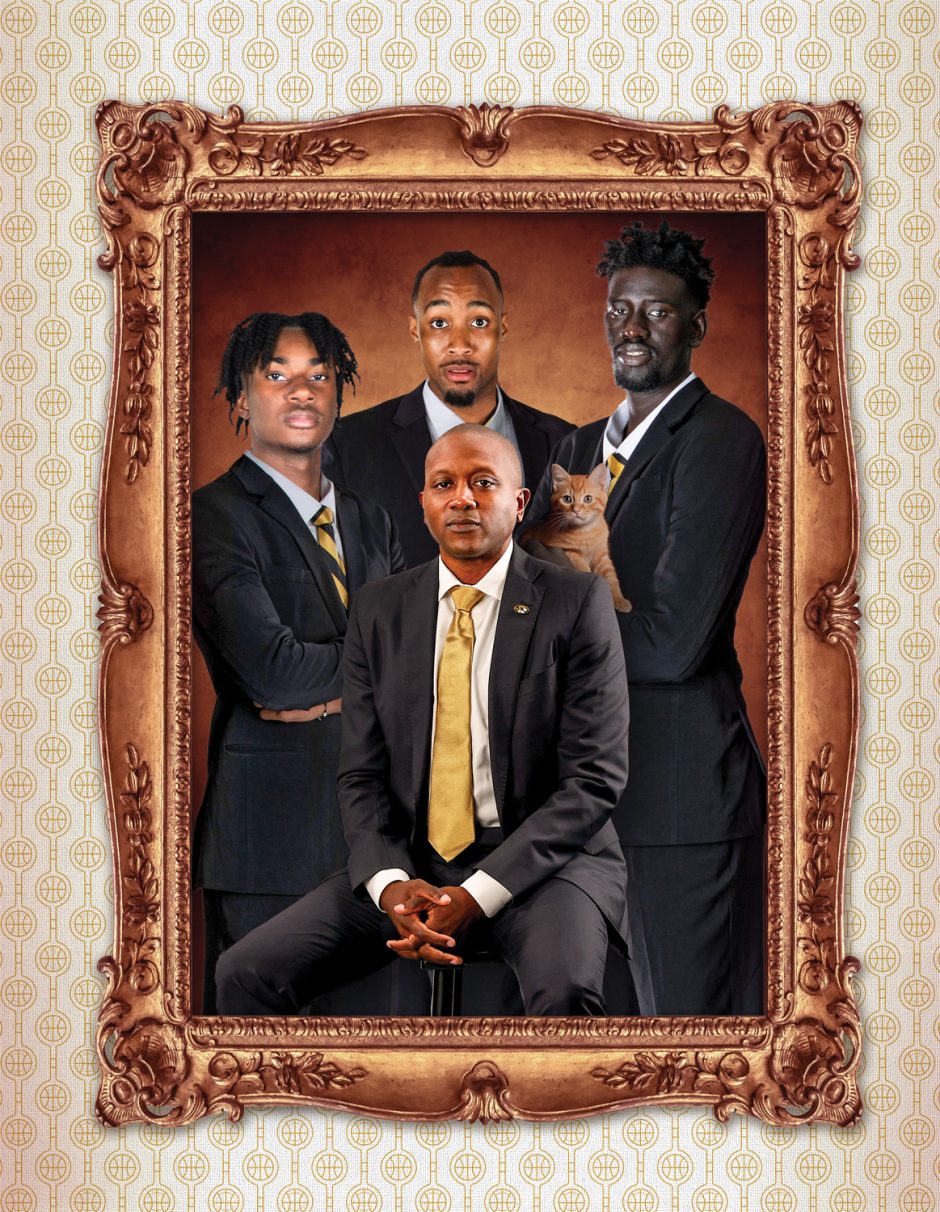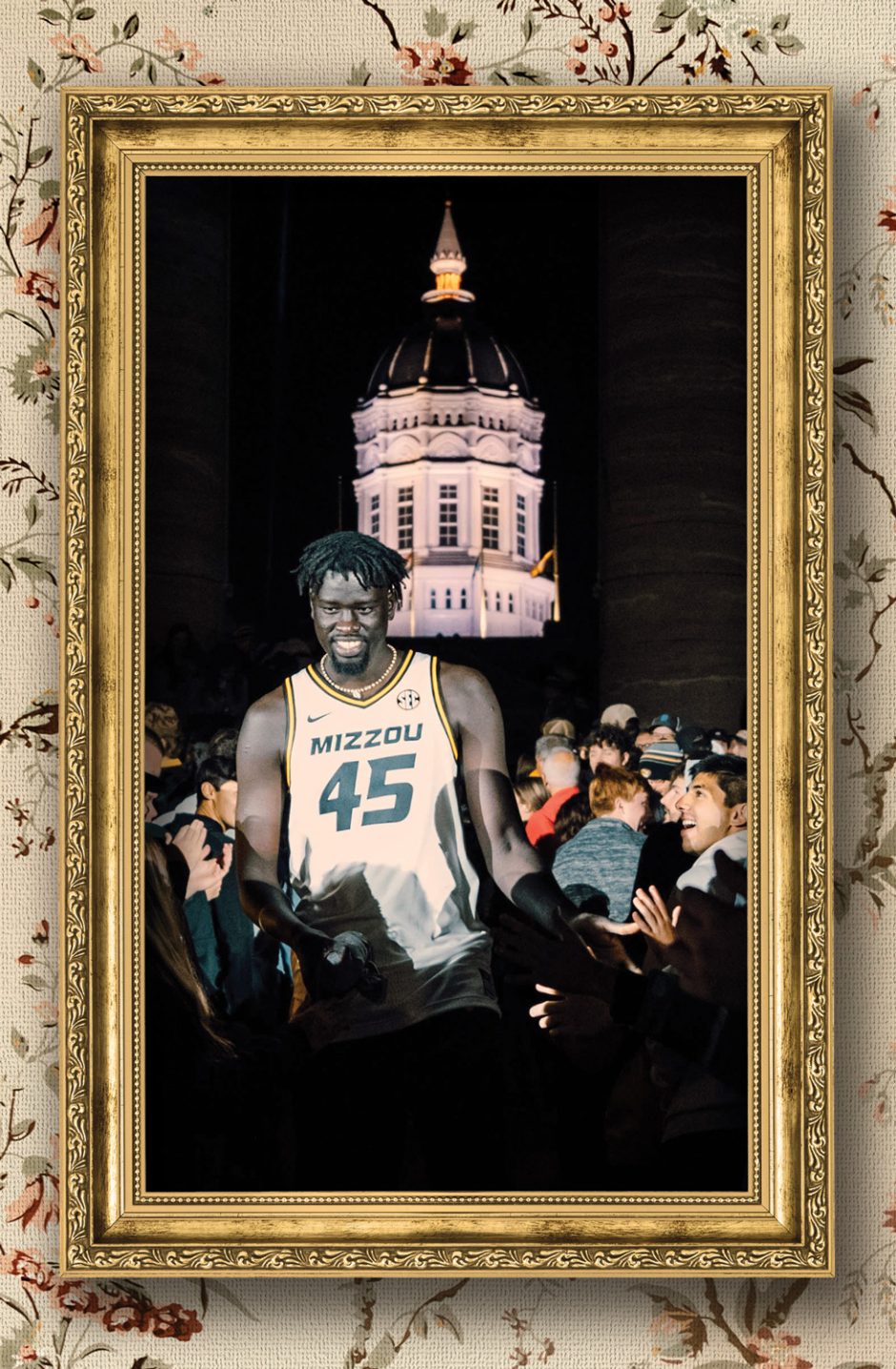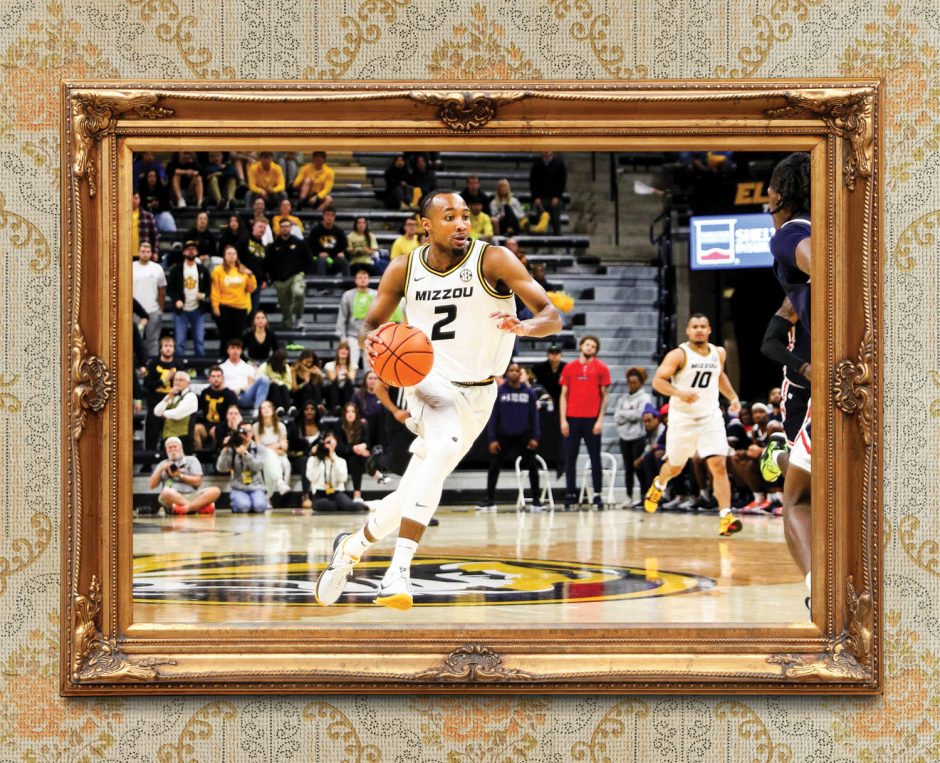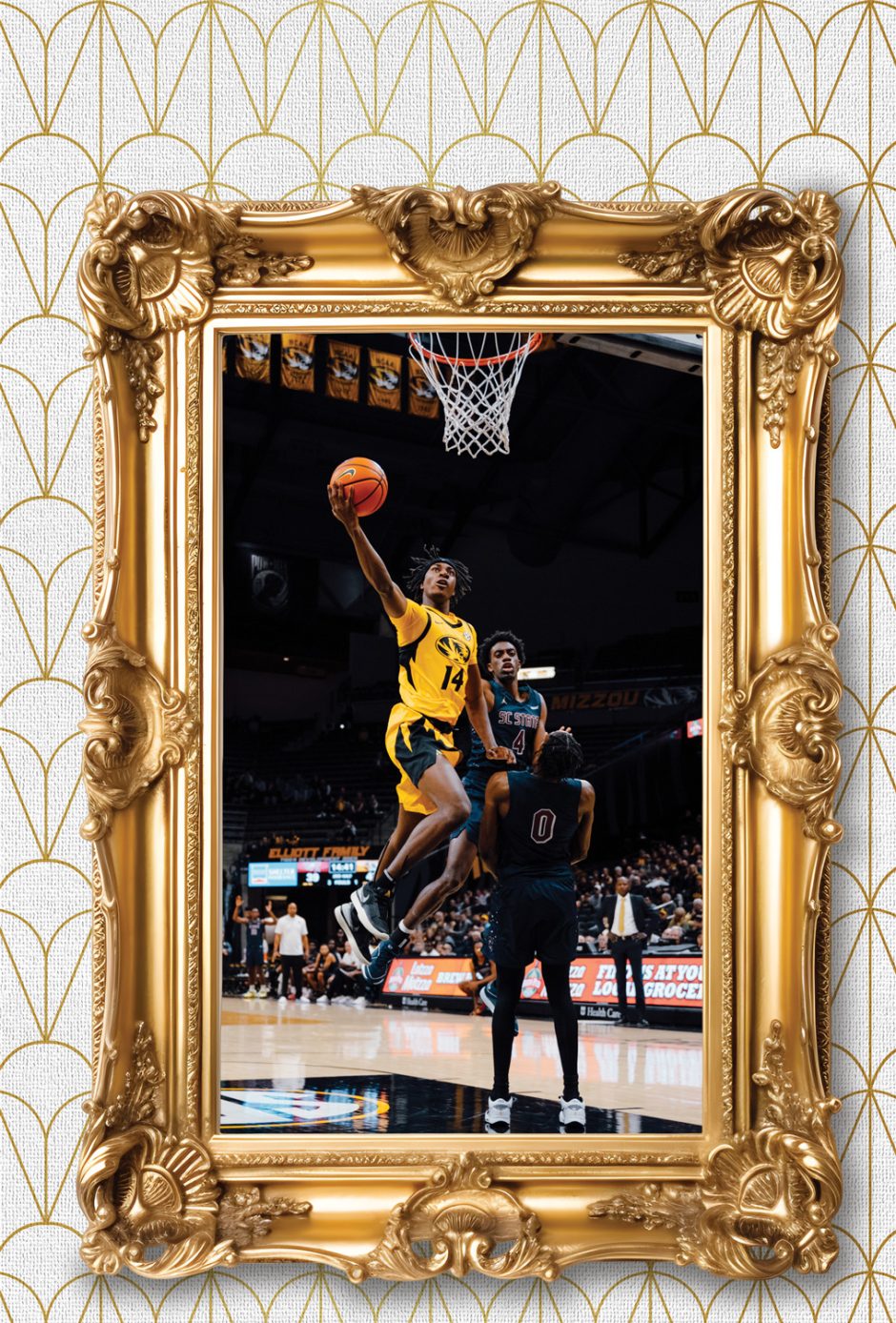
Published on Show Me Mizzou Jan. 10, 2024
Story by Tony Rehagen, BA, BJ ’01
This year, Missouri men’s basketball Coach Dennis Gates has a tough act to follow — his own.
Gates arrived in Columbia in March 2022 as an off-the-radar analytics wonk from Cleveland State scrambling to piece together a roster in disarray after the dismissal of Cuonzo Martin. After convincing junior star forward Kobe Brown to stay out of the transfer portal and bringing in a few key transfers of his own, including several from his previous post, Gates only managed to lead the Tigers to their best season since joining the Southeastern Conference in 2012.
More than the 25 wins, including a record-tying 11 in conference and the Tigers’ first “W” in the NCAA men’s basketball tournament in 13 years, Gates won over the masses. Fans and alumni once again packed Mizzou Arena, and media gushed (no less than the Washington Post claimed Gates’ community-building approach to the job could “transform college basketball”). Even opposing coaches had to acknowledge that the new coach had created an atmosphere of seemingly boundless optimism in and around Mizzou hoops.
Most importantly, Gates seems to have earned the unflappable confidence of his players — both those currently on the roster and those on their way. In fact, entering October, Gates’ 2024 recruiting class ranked No. 1 in the nation, besting those of blue-blood basketball schools like Duke, North Carolina and a certain Rock Chock-chanting rival to the immediate west.
But more than the star ratings of high school and junior college prospects, Gates is focused on the young men behind the numbers. He dedicates himself and his staff to not only making them better players on the hardwood but also better humans off the court. His mantra, which each of his players recites without hesitation, is “friendship, love, accountability, trust, discipline, unselfishness, enthusiasm and toughness.” To his student-athletes, at least, Gates embodies each of these virtues just enough to make them ring truer than some trite locker room poster.
Make no mistake: Gates is a salesman. He is peddling his system, his program and his university. But he is also selling himself. And in an age when any college athlete can become a free agent at virtually any time, it’s vital to Mizzou’s success that the right players keep buying.
MIZZOU talked to three Tigers who bought in: a returning player, a transfer from another school and a standout freshman. They say Gates and his assistants tailored their recruiting approach to each of them and their unique situations. The overall pitch and promise, however, was the same for all three. As Kobe Brown, now a forward for the NBA’s Los Angeles Clippers, once told this magazine: “The first thing [Coach Gates] told me was, ‘If I’m not invited to your wedding, I didn’t do my job coaching you.’”

Mabor Majak, Center, Returning Senior
Mabor Majak was walking around the Cleveland State campus with his phone in his hand, reluctant to release the device from his grasp. He didn’t want to miss the call.
It was early spring 2022, and only days before, Coach Gates had told the team that he had accepted the head coaching position at the University of Missouri. The man who had brought Majak and his teammates to Cleveland was moving on.
Majak remembers feeling many emotions after that announcement. Sadness was not one of them. He was genuinely happy for his coach and mentor. Coach Gates had been one of the first college coaches to come watch him practice and play at Hamilton Southeastern High School outside of Indianapolis, where Majak had fled from civil-war-torn South Sudan in the middle of his seventh-grade year. Majak had left much of his family in poverty to seek opportunity, and he had worked hard to strengthen and train his 7-foot-2 frame into the body of a top-3 Indiana prospect. He eventually got interest from the state’s basketball powers, IU and Purdue. But Gates had been there first.
Of course, it was more than that. Gates didn’t just arrive on Majak’s radar early — the coach came with a vision for the young center. He had coached 7-footers before at Cleveland State and as an assistant at Florida State. He sat down with Majak and his parents to map out what he saw as Majak’s role on the team and projected development through all four years of college. He also pledged personal growth — something that struck young Majak and his family. “He tries to learn about the person to a deeper level and understand them,” Majak says. “My dad is a major influence in my life, and he liked Coach Gates as much as I did.”
That sincere personal interest didn’t stop when Majak signed his letter of intent. At Cleveland State, the freshman was impressed by the close-knit team environment — the way his teammates and coaches were always openly rooting for one another. And Coach Gates’ door was always open, especially when Majak wanted to talk about the struggles back home in South Sudan. “He is always asking how my family is doing back home,” Majak says. “They go through things, and I can go into his office and talk about those issues. He guides me through the different obstacles. He’s not just a coach on the court.”
So, when Coach Gates revealed that he was leaving Cleveland State, Majak was rooting for his mentor. But part of him was also hopeful that, after the dust settled, Coach would call to invite him to accompany him to Mizzou. And eventually, Majak’s phone rang.
“I don’t remember where I was or what I was doing,” Majak says. “I just remember that it was good news and that I was really excited. I didn’t hesitate in saying yes. I trust Coach Gates with my future.”

Tamar Bates, Guard, Junior Transfer from Indiana University
Tamar Bates was looking for a reset.
In 2021, Bates chased his basketball dreams from his home in Kansas City to the University of Indiana. He arrived as a five-star high school recruit, No. 23 overall in the entire country and sixth among shooting guards. He was even projected as a potential NBA draft pick. But that star-bound trajectory didn’t launch at the angle he had hoped. Bates appeared in 32 games for the Hoosiers in his freshman year, shooting just 33% from the field and averaging only 3.9 points per game. His sophomore year showed glimpses of greatness, including 22 points against Jackson State and 17 in a huge conference win over Michigan to close out the regular season, but he failed to score a single point in IU’s two NCAA Tournament games.
Beyond that, life had changed for Bates. He had become a father to a daughter, Leilani, who was living with the rest of his family back in Kansas City. Suddenly, Indiana without fanfare or family was a very lonely place. The pull of home was stronger than ever.
The day Bates entered the transfer portal, Mizzou assistant Coach Kyle Smithpeters reached out. Coach Gates called Bates the next day.
“I was blown away by the detail of the plan he had for me,” Bates says. “It wasn’t just something they tell everybody; it was tailored for me. They told me the things they felt I was already doing well and the things I need to improve on. He looked at the data and what my percentages were. You can’t argue with the numbers. He said I’ve always been a good defender, but here is how I could become a first-team all-defense guy. They talked about playing at the next level and what the NBA is looking for out of guys of my stature and length and what Missouri is looking for.”
But much more than that, Gates talked about family.
“He went into things that most coaches don’t address,” Bates says. “He talked about the PTSD factor of what players go through at their previous schools. He was patient. He understood that it would be a process of getting me back to playing the way I’m supposed to and being myself on the court.”
An important part of Bates being more comfortable on the hardwood will likely come from being that much closer to KC and his family and Leilani. But he says he’s also found another family right here in Columbia. “Coach Gates comes in every day with a hug,” Bates says. “It’s a loving culture.”

Anthony Robinson II, Point Guard, Freshman
A point guard is a floor general, calling plays and ensuring the rest of the team is where it needs to be. The position requires intelligence, vision and a commanding presence. More than anything, it requires an authoritative voice.
Anthony Robinson II made himself head running point for Florida State High School in Tallahassee, where he led the team to a state championship while building a four-star college recruiting resume. But that hype can make it even more daunting for a freshman to dribble to the top of the key at a Division I school and direct a group of juniors and seniors.
Maybe that’s why Coach Gates stood out. During a long and grueling recruiting process, through which hard-charging college coaches were bombarding Robinson and his family with their sales pitches, Gates and his assistants always wanted to hear what Robinson had to say. “He’s straightforward,” Robinson says. “He never changes for the camera. He’s always 100% himself. And it’s not just him talking to me; I could talk to him.”
That open atmosphere continued after Robinson arrived on campus for his freshman year. “He’s helped me a lot of with the point guard spot,” says Robinson, adding that Gates has “helped me with small things about talking and communicating and being more vocal on and off the court. Here, anybody can check someone. It could be a senior talking to a freshman or a freshman talking to a senior. We all accept that they’re doing it for the betterment of the team. It’s not personal.”
The two-way line of communication isn’t confined to the court, the locker room or the arena. Even when Gates has had to come down on Robinson or one of his teammates on the floor, the coach will call or text to check up on them to make sure they are alright. And that has laid the foundation for the entire team and staff to naturally want to bond, learn about one another, share their thoughts — and, of course, bring home a National Championship.
To read more articles like this, become a Mizzou Alumni Association member and receive MIZZOU magazine in your mailbox. Click here to join.



